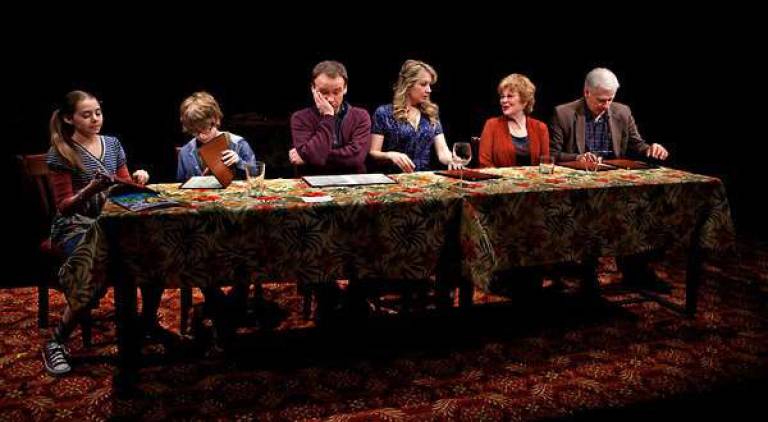The Big Deal

Dan LeFranc has constructed the play of a lifetime By Doug Strassler "Auntie Mame" would fit right in with the family depicted in playwright Dan LeFranc's The Big Meal. Her "life is a banquet" sensibility echoes throughout the show, running at Playwrights Horizons after a decorated turn in Chicago last year, in which events unfold over generations in the life of an "every family" at a series of restaurants. Even without Auntie Mame in tow, however, there is plenty on which to feast: Big Meal boasts one of the greatest ensembles to unite on the New York stage this year. LeFranc's conceit is for multiple actors to chart the growth of multiple family members. So when twenty something Sam starts dating carefree waitress Nicole, they're played by Cameron Scoggins and Phoebe Strole, respectively. And as their relationship becomes more serious, they evolve into performers David Wilson Barnes and Jennifer Mudge, with solid younger actors Griffin Birney and Rachel Resheff playing their children and Tom Bloom and Anita Gillette, Sam's parents. Eventually, Scoggins and Strole play these children at an older age, and as the characters evolve into adulthood, they will morph into Barnes' and Mudge's carefully calibrated form. LeFranc marks the passage of time by presenting milestones in the show's restaurant settings ? marriages, affairs, childbirth, and, most pivotally, death, marked by the arrival of a waitress (a mute but communicative Molly Ward) arriving with a last meal. This style, directly inspired by A. R. Gurney's The Dining Room and Thornton Wilder's The Long Christmas Dinner, has the same effect of a slasher movie. The audience watches, knowing that inevitably, another character's death looms at some point with the arrival of the waitress ? i.e., the grim reaper. And like real life, we don't know when or how (or even for whom) death will come, so it's up to us to relish what happens in between. Yes, in taking a cue from Virginia Woolf's To the Lighthouse, this family lives in the Big Moments, but LeFranc leaves it up to the audience to stencil in all the imaginary universalities that exist in between. It helps tremendously to have New York theater anchor Sam Gold, whose prolific resume is bested only by his rapt interest in how people connect to one another, in the director's seat. Gold's invisible hand illuminates every aspect of LeFranc's heartfelt work, elevating it beyond a device. Hurtling through time with the flourish of a David Ives play, Gold is able to build suspense and provide humor and emotional resonance; Meal is clipped and then slow in all the right places. Even seemingly pedestrian rites of passage feel fresh and moving. His cast does terrifically specific work in each of their roles as the growing members of the family, particularly as Bloom distinguishes Sam's crass father with Nicole's gentler one and Barnes, who bounds terrifically from cavalier young father to calcified older one. Gillette, too, is heartbreaking. It's to everyone's credit that a tongue-in-cheek line like "You look just like your mother" will elicit both a chuckle and a teardrop. There are few journeys like the rich one taken by the family in Meal, one of the most affecting works of any entertainment to be found this season. Mame Dennis would be so exited ? there isn't a sucker in the bunch. The Big Meal Playwrights Horizons' Peter Jay Sharp Theater, 416 West 42nd Street, between 9th & 10th Avenues. http://www.playwrightshorizons.org/sharp.asp